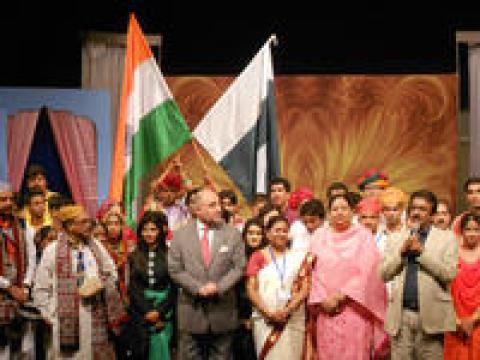Pakistani Rovers host Indian contingent for the 2nd special integration camp

In the second round of the integration camp of Scouts and Guides from India and Pakistan, each had the opportunity to know and learn from each other in many ways.
The 2nd special integration camp held from 2nd to 6th May 2012 is one of the Messengers of Peace projects running in the Asia-Pacific. The first camp was held in November 2011 in India where about 300 Indian Rovers and Rangers and 55 Pakistani Rovers and leaders camped together.
The camp began when 73 Scouts and Guides, headed by Shree Geeta Rawat of Bharat Scouts & Guides set their foot at the Wagha border, in Lahore, Pakistan and met up with the Scouts from Punjab Boy Scouts Association after a five-hour journey by land.
Pakistan Prime Minister H.E. Syed Yousaf Raza Gillani, who was the chief guest, inaugurated the camp and was honored to host this peace initiative taken by WOSM, King Abdullah bin Abdulaziz Al Saud of Saudi Arabia and King Carl XVI Gustaf of Sweden.
Pakistan President Asif Ali Zardari said “by fostering a common bond, Scouting becomes an important vehicle to promote peace, and unleash the creative potentials of young people.”
PBSA Chief Commissioner Mr Justice Agha Rafiq welcomed the participants and spoke about the objectives of the camp along with its friendly activities. Participants were provided with activity books where they recorded their interests and addresses so they can continue their friendship even after the camp. Participants appointed two members from each group during the Youth Forum where they discussed plans to further reinforce the tie that binds the young people of Pakistan and India, even the ones outside Scouting.
Mr. Zafar Iqbal (Pakistan) was elected Chairman, Mr. Kamal (India) as Vice-Chairman and Ms. Nousheen Shaikh (Pakistan) as Secretary led the Forum and recorded their final recommendations. PBSA Young Media Commissioner Mr Rizwan Jaffar covered the forum.
In another integration session, a dialogue was held at the Allama Iqbal Open University where participants exchanged views with other young people outside Scouting, which was seen in different popular TV programs. A cultural show followed by Pakistan National Council of the Arts where not only Scouts and Guides performed but also the national arts group of Pakistan. For another art exploration, the group headed to museum and Islamabad Model College for Girls where art students shared their paintings following the camp's theme.
From arts, participants enjoyed the food and cultural exhibition where everyone had a taste of authentic Indian and Pakistani food. Special reception was organized by PBSA national commissioner Syed Mehmood Hashmi at his farm house and hill restaurant in Islamabad where Vice Chancellor Allama Iqbal Open University Dr. Nazir Sangi and Chamber of Commerce & Industry Islamabad President were invited. The night ended with a beautiful campfire where Scouts enjoyed doing different cultural performances in open air.
At the closing ceremony on 6th May, Chief Commissioner Rafiq and Camp Director Cdr. (Retd) Aftab Qureshi thanked all participants. Chief Justice of the Federal Shariat Court was the chief guest who assured the continuation of the integration camp and his future support.
At midnight of 6th May, the Indian contingent left Islamabad and was welcomed at Pakistan Railway headquarters in Lahore for a one-day home hospitality. Punjab Boy Scouts Association arranged lunch at Shalamar Garden, reception at Lahore Fort and dinner at the Government College University ended with a campfire programme organized by the Rovers. The following day, Scouts spent the day seeing the National Science Museum, national monument Minar-e-Pakistan, religious sites like Gurdavara and the famous shopping bazaar “ANAR KALI” in Lahore.
On 8th May, with tears of joy, the Pakistan Scouts and leaders said goodbye to their Scouting brothers and sisters from India as they crossed the border.
Contingent Leader Ms Geeta Rawat appreciated the warm hospitality and the efforts extended to them by Pakistani friends. Rawat said, experiencing that kind of hospitality made our going home very difficult.”




